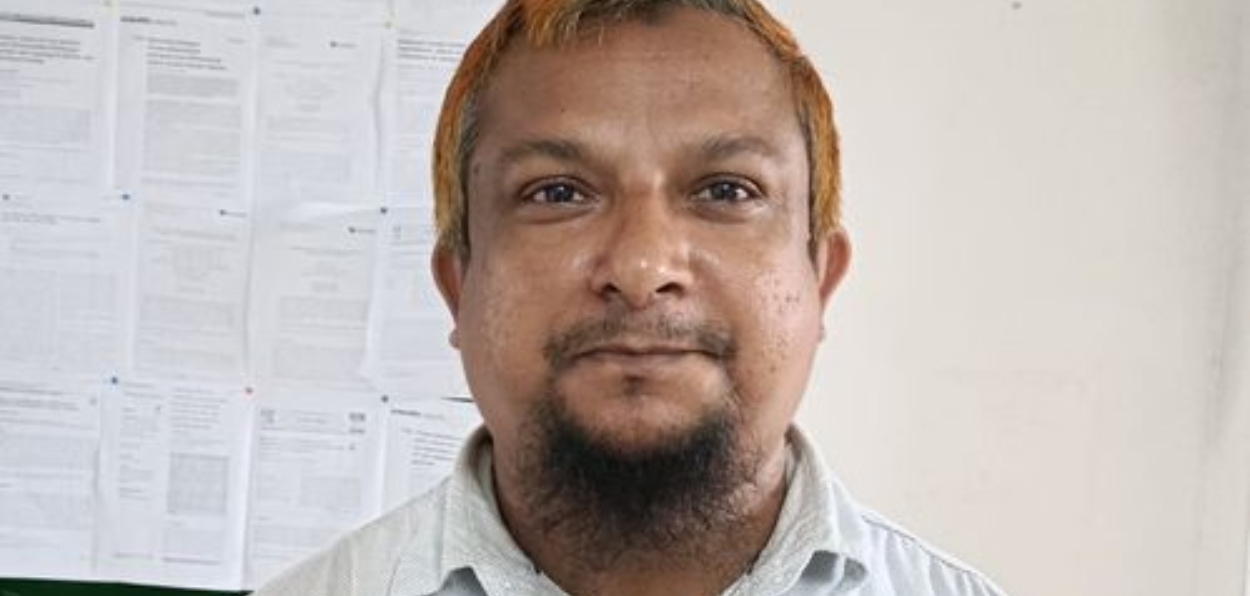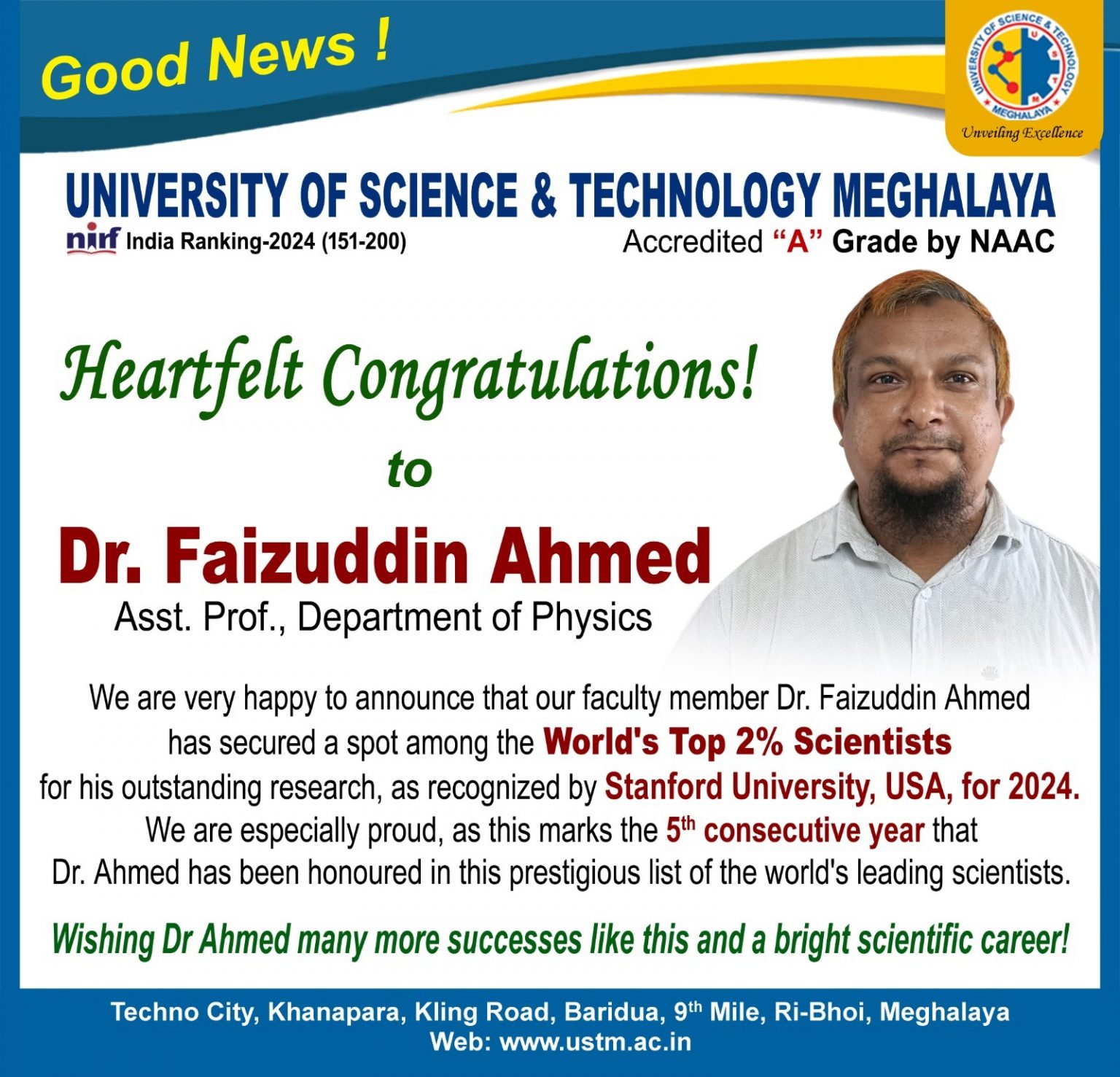
Rita Farhat Mukand
Walking into Dr. Faizuddin Ahmed's cool and neat office inside the campus of the University of Science and Technology Meghalaya (USTM) with his silver laptop well balanced on a stand, books piled sprucely, one can gauge he had a methodical orderly mind.
An assistant professor in the Department of Physics at the USTM, Dr Ahmed has been recognized by Stanford University, USA, as one of the world’s top 2 percent scientists for 2024 along with over 1,000 other Indians. His achievement - the fifth time in a row - is being celebrated by academia across the Northeast.
The list published on September 16, 2024, highlights global scientific excellence, with Dr. Ahmed being honoured for his groundbreaking research in Theoretical Physics, particularly in General Relativity and quantum mechanics.
The 35-year-old scientist expressing his gratitude upon receiving the prestigious honour said: "It is truly humbling to be recognised by Stanford University for the fifth year in a row. This achievement highlights the significance of dedicated research and the relentless pursuit of knowledge. I am deeply thankful for the support from USTM and my colleagues."
He also said, “This honour is a testament to the value of persistence, research, and the pursuit of knowledge. I owe a great deal of gratitude to USTM and my colleagues for their unwavering support.”
He came across as a polite, soft-spoken, and cordial person as he shared bits and pieces of his life.
The campus of University of Science and Technology Meghalaya
He was born in the Dhubri district western part of Assam, India, known for its rich cultural diversity and historical significance seated along the banks of the Brahmaputra River. Dhubri district, one of the least literate minority districts in the country according to the Sachar Committee Report of 2006 has posed challenges for development with very few schools in the proximity.
While the agrarian landscape in Dhubri was rich in rice, jute, and mustard and flourishing trade with the international borders was tied particularly with Bangladesh, jobs and education in the region were scarce.
Faizuddin Ahmed was raised in a family grappling with financial challenges, which shaped his resilience and determination from a young age.
“We are a large family - seven brothers and seven sisters. My father was a school teacher, but his salary was not enough to support everyone,” Ahmed says. He went to a government school in Dhubri and achieved his BSc in Physics from Bhola Nath College, Dhubri, in 2006.
At first, Ahmed set out to earn a degree to secure a job. Yet, it was the unwavering support and encouragement from his teachers at Bhola Nath College, and later at Guwahati University, that ignited a new passion within him. By the time he completed his master’s degree in 2009, he was inspired to embark on a different journey altogether plunging his life into a higher ambition.
He says, "We had a teacher, ‘Zaman Sir,’ who was a respected scientist in the 1980s and 1990s. My interactions with him motivated me to continue my studies….in the postgraduate program, another teacher, Dr. D. Sharma, taught general relativity - a difficult subject-in such a simple and clear manner. I approached him to be my PhD guide. These two teachers were a huge source of inspiration for me."
Riddled with challenges throughout his academic journey, he overcame them with resilience and determination. As he navigated his undergraduate, postgraduate, and PhD studies, to support himself, he took on the role of a private tutor for schoolchildren. Financial times were so tough that he took off a year between completing his BSc and enrolling in his MSc to save enough money to continue his education. With perseverance, he finally earned his PhD in 2016, consistently achieving first-division honours in every final exam, from matriculation to postgraduate levels. His story is one of triumph against the odds, illustrating the power of single-mindedness and commitment along with his sharp memory and scientific skills.
 USTM notice about honour of Dr Faizuddin Ahmed
USTM notice about honour of Dr Faizuddin Ahmed
However, the pathway for scientists to achieve their dreams faced obstacles without easy accessibility to material. Ahmed shares, “It was tough. I could only access open journals, while most were behind paywalls, requiring institutions to pay large sums for access. Our institute had no such facility,” He explained, “I couldn’t access the latest research papers, nor did I have any subscriptions to quality journals. I had to rely on Sci-Hub, which is a vital resource for researchers like me. Through Sci-Hub, I was able to download non-open-access papers.”
Sci-Hub is a website that provides free access to thousands of copyrighted scientific papers, bypassing paywalls. India has the second-largest number of Sci-Hub users in the world. Recently, the site was sued in India by three major academic publishers for copyright violations. To date, he has published over 165 research papers in various internationally reputed journals, including those by Elsevier and Springer publishers.
“This achievement (top 2% scientists by Stanford University for the fifth consecutive time) doesn’t benefit me directly, but maybe it will inspire students in the future,” Ahmed observed.
“In my district, most youths don’t pursue higher education. Their primary concern is whether their education will lead to a job or not. The unemployment rate here is high, and people only study to secure a government job. For me, it’s a significant achievement to have made it this far, coming from my district. Perhaps I can serve as a role model for future students from Dhubri.”
Despite his impressive accomplishments, Ahmed has been striving to secure a position at a government university for several years. Although he successfully passed the University Grants Commission’s National Eligibility Test (UGC-NET) twice in 2014, he has yet to get a government job. Nevertheless, he remains optimistic about joining a government college or university to support his family and advance his research.
“Right now, I’m working at the University of Science and Technology Meghalaya (USTM) a private institute. Although they have almost all the basic facilities, they don’t have subscriptions to the latest journals or resources like a math lab, which are crucial for theoretical physics,” Ahmed noted.
USTM in the meantime has continued to excel academically under the leadership of founder Mahbubul Hoque and nurtured a diverse student body, with 80% of its students being Hindus, and is the best private university in the area, securing NIRF-National Institutional Ranking Framework 2024 ranking for the 3rd consecutive year by the Ministry of Education, Government of India.
Dr. Ahmed’s recognition affirms the university’s commitment to academic excellence and inclusivity. His consistent recognition on the global stage not only highlights his brilliance but also positions USTM as a hub for scientific research and innovation, standing tall despite its young inception in 2012.
This global recognition of Dr. Faizuddin Ahmed’s marvelous scientific accomplishments not only highlights his dedication but also underscores the quality of scientific research conducted at the University of Science and Technology Meghalaya at the borders of Guwahati.
ALSO READ: JMI team secures patent for research on fungal medicine
His breakthrough achievements serve as an inspiration to aspiring scientists and assert USTM’s unwavering commitment to fostering world-class research and innovation as a progressive movement to build a scientific climate in the country.
Rita Farhat Mukand is an independent writer and author.
